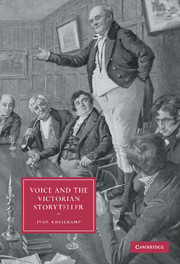Book contents
- Frontmatter
- Contents
- Acknowledgments
- 1 “The best man of all”: mythologies of the storyteller
- 2 When good speech acts go bad: the voice of industrial fiction
- 3 Speech on paper: Charles Dickens, Victorian phonography, and the reform of writing
- 4 “Done to death”: Dickens and the author's voice
- 5 Unuttered: withheld speech in Jane Eyre and Villette
- 6 “Hell's masterpiece of print”: voice, face, and print in The Ring and the Book
- 7 A voice without a body: the phonographic logic of Heart of Darkness
- Notes
- Bibliography
- Index
- CAMBRIDGE STUDIES IN NINETEENTH-CENTURY LITERATURE AND CULTURE
1 - “The best man of all”: mythologies of the storyteller
Published online by Cambridge University Press: 22 September 2009
- Frontmatter
- Contents
- Acknowledgments
- 1 “The best man of all”: mythologies of the storyteller
- 2 When good speech acts go bad: the voice of industrial fiction
- 3 Speech on paper: Charles Dickens, Victorian phonography, and the reform of writing
- 4 “Done to death”: Dickens and the author's voice
- 5 Unuttered: withheld speech in Jane Eyre and Villette
- 6 “Hell's masterpiece of print”: voice, face, and print in The Ring and the Book
- 7 A voice without a body: the phonographic logic of Heart of Darkness
- Notes
- Bibliography
- Index
- CAMBRIDGE STUDIES IN NINETEENTH-CENTURY LITERATURE AND CULTURE
Summary
This book questions and hopes to trouble a well-entrenched commonplace concerning the relationship of speech to writing. It is no exaggeration to say that contemporary criticism is haunted by the paradox that speech is both extremely powerful and doomed to cultural obsolescence. “Writing is the destruction of every voice,” Roland Barthes famously proclaims in “The Death of the Author,” articulating a half-triumphant, half-guilty belief concealed at the heart of contemporary print culture. Most of us assume that orality is an attenuated relic of an era before the rise of modern print culture – and at the same time, a force latent in suppressed groups and indeed parts of our own selves, capable of disrupting writing with all the force of a resurrection. Contemporary literary criticism takes it for granted that members of pre-novelistic cultures relied on modes of oral communication exemplified by communal storytelling, and that the advent of print displaced the spoken word as the glue holding modern societies together – thereby driving speech into obsolescence. Studies of modern print culture have too often either neglected voice, speech, and orality entirely or romanticized the vocal as a remnant of a lost and mourned pre-modern past. The distinction between a pre-modern “oral culture” and a modern print culture thus becomes a narrative of the fall from an idealized folk to a degraded mass culture.
Walter Benjamin provides the classic articulation of the longing generated by the supposed displacement of voice in his melancholic 1936 essay “The Storyteller.”
- Type
- Chapter
- Information
- Voice and the Victorian Storyteller , pp. 1 - 34Publisher: Cambridge University PressPrint publication year: 2005



